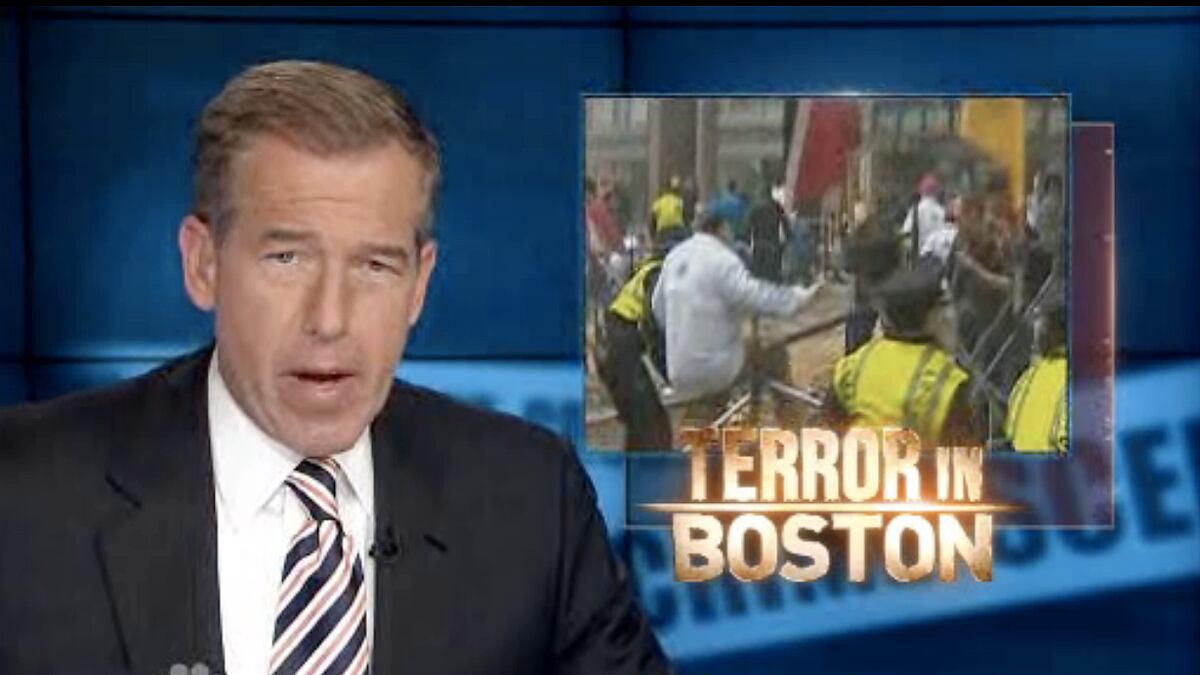The pictures were horrifying, the experts measured, the anchors somber.

The bombings at the Boston Marathon on Monday afternoon sent the television networks scrambling to cover a stunning act of terrorism that seemed almost a throwback to an era when such attacks were common.
As in the dark days after 9/11, those on the airwaves were serious, substantive, and restrained, resisting the urge for melodrama or reckless speculation. When there is a story of sufficient magnitude, as happened at the twin towers and again near the finish line of the Boston race, news outlets don’t need to resort to hype and hysteria. They simply sort through the painful facts that slowly emerge.
But in a sign of the digital times, the first cable news reports were about 10 minutes behind messages posted on Twitter.
NBC, CBS, and ABC went into breaking-news mode, bringing in their law-enforcement experts like their cable cousins. Every network repeatedly replayed the footage of the blasts, some shot by The Boston Globe, knocking runners and bystanders to the ground, much as the nation kept watching the second plane hit the World Trade Center nearly a dozen years ago.
The one serious media mistake were the widespread reports that a third bomb had exploded at Boston’s JFK Library; that turned out to be an unrelated fire.
“We have no idea who’s behind this,” said CBS’s Bob Orr, who nonetheless suggested the possibilities. “It could be al Qaeda…or a domestic lone wolf or domestic group.” CNN contributor Peter Bergen said the possibilities included al Qaeda terrorists and “right-wing extremists,” as in the Oklahoma City bombing, which some in the media initially suggested was the work of Middle East terrorists.
By and large, though, the tone was careful and concerned. ABC’s George Stephanopoulos did not respond passively as Allan Panter, a doctor on the scene, described people’s limbs being blown off. “Oh my goodness, I’m so sorry…Boy, that is so hard to hear,” the anchor said.
CNN contributor Fran Townsend, a counterterrorism official in the Bush administration, used her sources to report that both bombs were contained in “small packages” that did not contain highly explosive chemicals—a “more crude device,” as she put it.
“Still a killing device,” Wolf Blitzer said.
At Fox, news anchors Bret Baier and Shepard Smith handled the news. But MSNBC made the curious decision to let Al Sharpton, no one’s idea of a breaking-news specialist, take the reins from Chris Matthews when his hour came up. The reverend was assisted by Mike Barnicle, a former Boston columnist who at least knows the cop scene there.
There is a choreography to these tragedies. Anchors and reporters mostly stay off the screen as the shaky footage—there were all kinds of cameras assembled for the 27,000-person marathon—fills the screen. This intersperses with video from the aftermath, including heart-rending scenes of blood-splattered victims being wheeled away for medical attention.
Top officials step before the cameras, sharing what information they have and offering words of reassurance: Massachusetts Gov. Deval Patrick; Boston Police Commissioner Edward Davis; President Obama, vowing to “get to the bottom of this” but refraining from calling the bombings a terrorist attack (even as sources were reporting that the FBI was using such a classification).
Consultants from ex-detectives to former FBI profilers take turns in the chair, a booming business that included a phalanx of retired generals during the Bush years but whose ranks have been thinned by several years of relative quiet. Former Boston police commissioner William Bratton pulled marathon duty for NBC and MSNBC.
When the network evening newscasts, all expanded to an hour, came on at 6:30, they provided a reset.
“Of all places, of all days, this was Patriots’ Day in Boston,” said Brian Williams.
“Cities around this nation are on high alert,” said Diane Sawyer.
“At least two people are dead, although that number is expected to change,” said Scott Pelley.
Although its role as the town square has partially been usurped by the Web, television still plays a unifying role in such national moments, a place to turn for information and perhaps sharing the sense of grief and disbelief.
As the hours went on, there was chatter about whether the mid-April timing might be related not only to the income tax deadline but such past attacks as Oklahoma City and the end of the siege at Waco.
In the coming days, the terrible footage, if overplayed, could become video wallpaper. Television outlets may revert to the norm by speculating more aggressively, and partisans will point fingers about preparedness and perhaps blame the city, or the state, or the Obama administration. But for now, at least, journalists produced a marathon of coverage without making matters worse.






